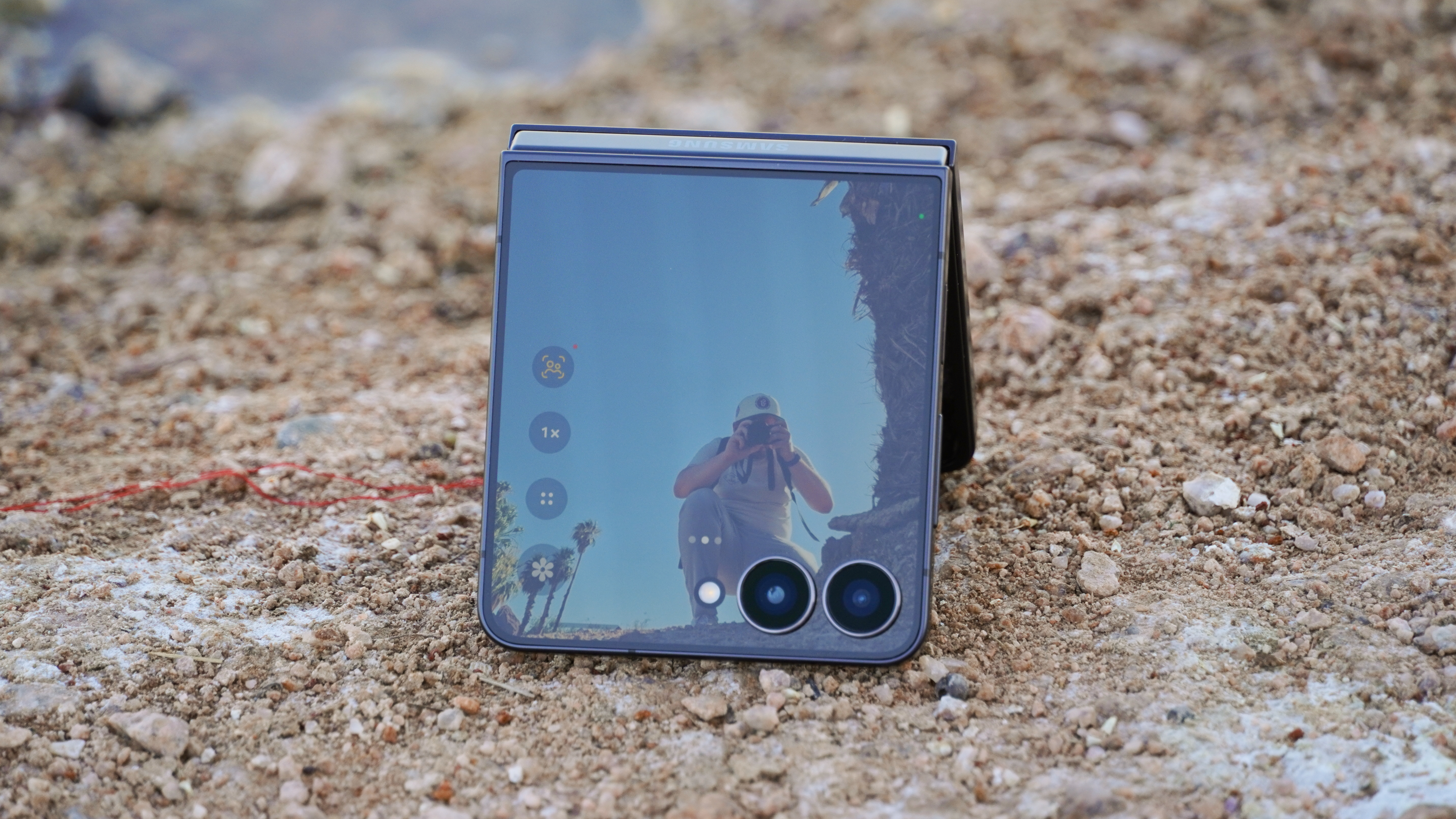Switching to Android: Comparing the core iOS vs Android apps
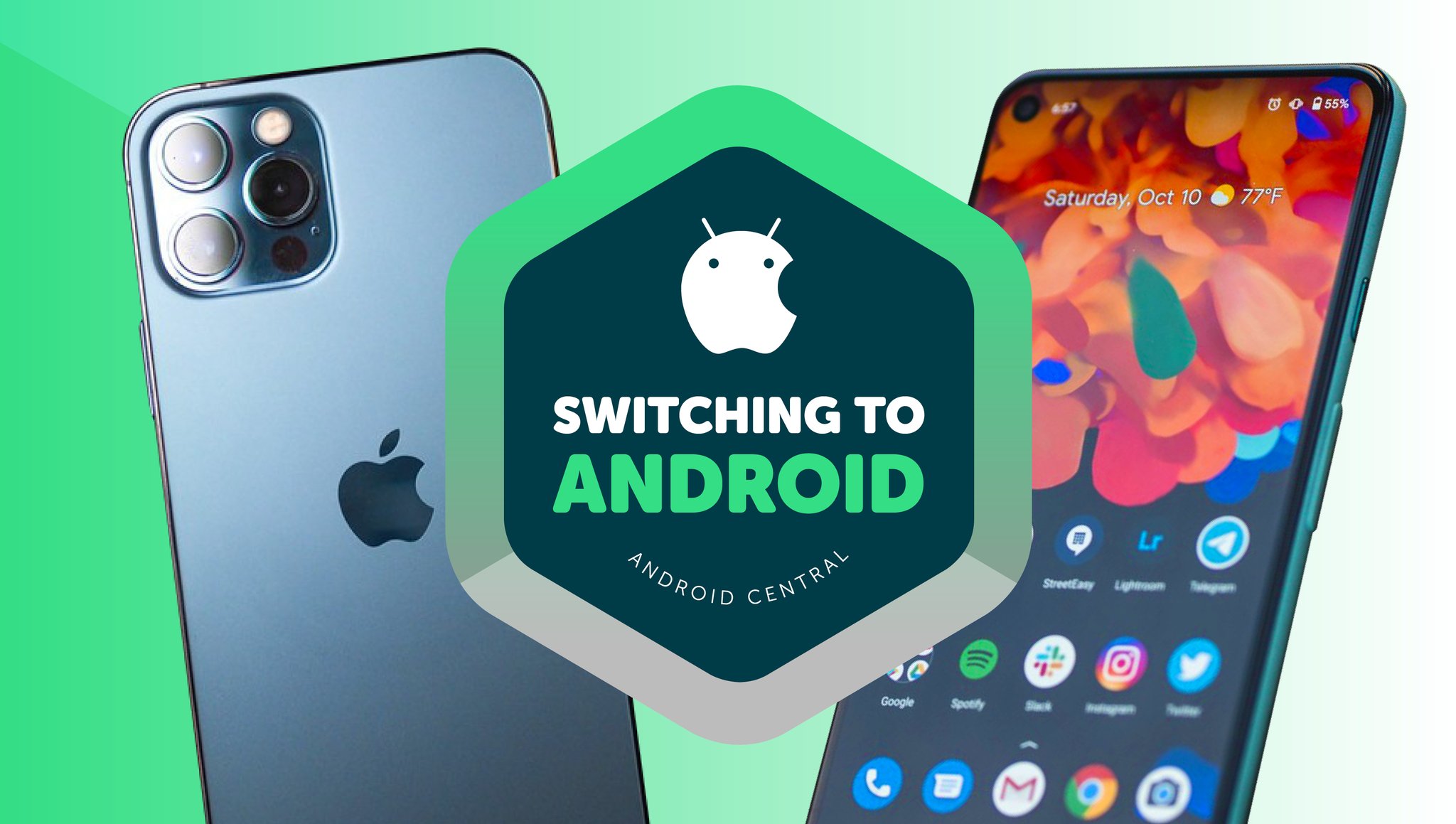
Get the latest news from Android Central, your trusted companion in the world of Android
You are now subscribed
Your newsletter sign-up was successful
Updated 3/10 Updated to mention that Apple Pages does have tools for online collaboration without an iCloud account. I apologize for the error.
As part of my Switching to Android journey, I'm documenting the differences between the two operating systems, exploring the Android features that you might take for granted, but which iOS users may find are a compelling reason to switch sides.
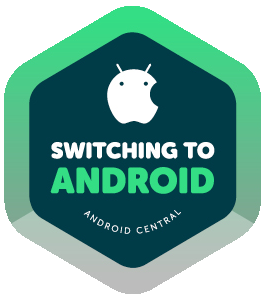
When I asked readers what made them choose iOS vs. Android phones, their reasons varied — Android for price, customization, more innovative hardware, and Windows connectivity, or Apple for privacy, long-term updates, better backups for annual upgrades, and simple competency. Many readers described using one for work and one for casual browsing. Some still regularly customize or root their Android phones, but a few readers said they'd grown tired of bothering with that and preferred Apple delivering things to them on a safe, boring platter.
I really appreciated people's perspectives! So while I followed up that post with a discussion of how Android launchers put iOS 14 to shame, I knew that for many people, customization matters less than the core apps and functionalities that each OS ecosystem offers.
So for today's column, I thought I'd focus on the core iOS and Android apps, seeing how they compare with one another. Obviously, Apple apps sync really well with Macs, while Google is the obvious choice for Chromebooks (and Windows, to a lesser extent). But beyond that, which apps are actually better in 2021 for productivity or daily use? Is there something about Apple's apps that make daily use better or easier? We'll scratch the surface and compare a few of the biggest iOS vs. Android apps.
Apple Photos vs. Google Photos
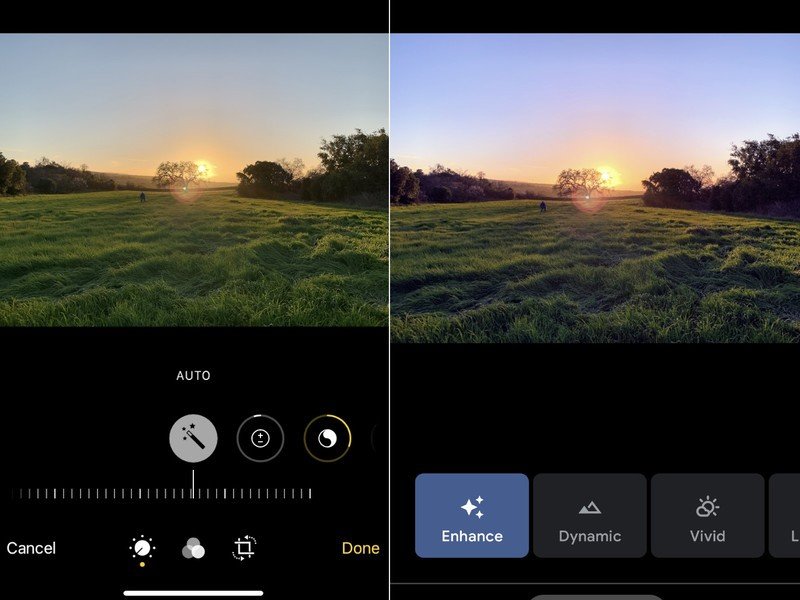
Google creates such reliable apps for iOS that a ton of Apple users, myself included, rely on them instead of Apple's core apps for productivity and general information. But Apple Photos was one app where I never felt tempted to switch, despite some annoying flaws, because it actually holds its own against Google Photos.
Not in every area, mind you. For starters, cloud storage with Google Photos is obviously better, thanks to its 15GB of free storage (plus unlimited photo storage for Pixel owners) vs. 5 GB with iCloud that's shared with your app backups. There's a reason Google Drive is our best cloud storage service pick while iCloud isn't on the list.
Get the latest news from Android Central, your trusted companion in the world of Android
Sharing photos on Google Photos is a breeze, but it's more like walking into a gust of wind with Apple Photos.
Google is also leaps and bounds ahead of Apple when it comes to creating a shared family album. Apple does have shared albums and AirDrop, but different users can't access and edit the original photos unless you all login to the same iCloud account. My family tried shared albums for a while but ran into so many issues that we now just text each other photos instead. Google, meanwhile, has shared albums where every linked Google Account has full access to add or edit photos, plus a Partner Sharing tool that lets you send all photos of particular faces from a certain date onwards to another account.
So why am I arguing that Apple stands toe-to-toe with Google in this area? Because Apple handles photo editing just as well as (if not better than) its rival, it is the only one to offer a desktop app, and it does AI categorization surprisingly well given it's Google's forte.
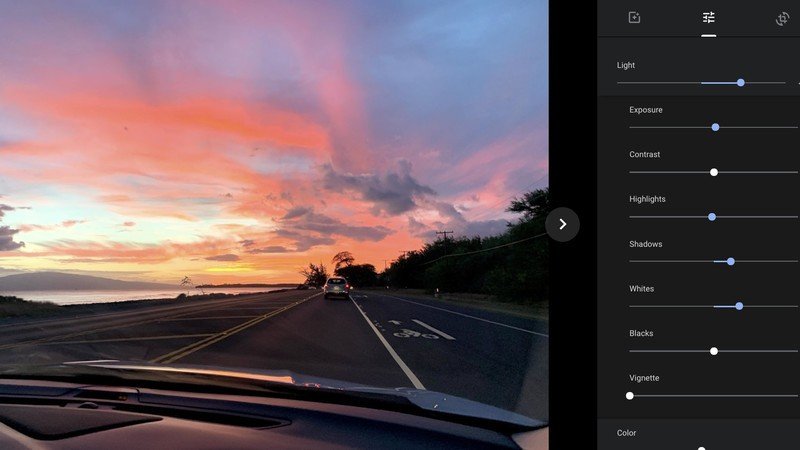
Between Google Photos' new photo editor and Apple's editing tools, there wasn't too much difference in quality after testing them out. Both have filters, cropping, and various adjusting tools, some of which can be done automatically using AI recommendations. How "good" they end up will only be limited by your own skills and tastes.

Meanwhile, the Mac Photos app has some extra tools like removing red-eye and adjusting curves that are more robust than the app version and don't exist in Google Photos. Google Photos for Web, meanwhile, is pretty milquetoast, even with its new navigation features. It gives you more space to look at your photos than a tiny phone screen, but otherwise, it doesn't do anything that the mobile app can't. It mostly exists to find and download photos to your computer.
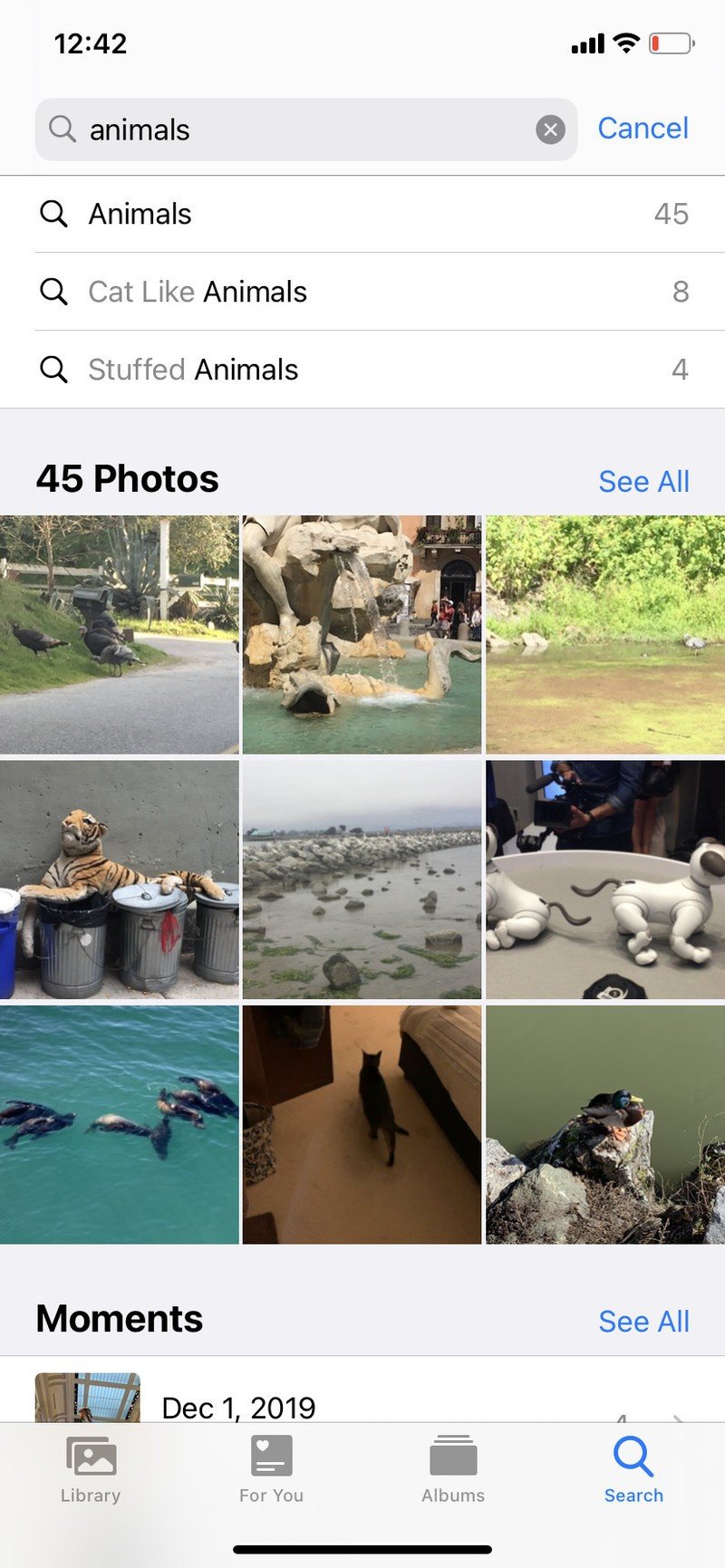
Both Apple and Google use AI to detect faces or text in your photos and organize them automatically. However, Google's Live Albums make it much easier to share particular photos of a person with that person. You probably know that Google has image detection AI for letting you search your photo library by other parameters, such as recognizing the "beach," "food," or "sports" and pulling up every beach vacation or little league game all at once. What you may not know is that Apple does this too!
I did basic searches for both apps and found that both did a pretty good job finding what I was looking for. They both had a tendency to mischaracterize things — like assume that a blue sky was a "lake" — but I'd rather get false positives than miss some photos entirely.
There's a whole other discussion to be had about iPhone camera quality vs. Android cameras'. But strictly talking about whether iOS handles photos better, I'd argue that it's a toss-up and depends on whether you're someone that would like to share your photos with others regularly or just add your personal collection to an online photo book service. Thankfully, Apple users can easily transfer their iCloud photos to Google Photos now if the latter service appeals to them.
Docs vs Pages
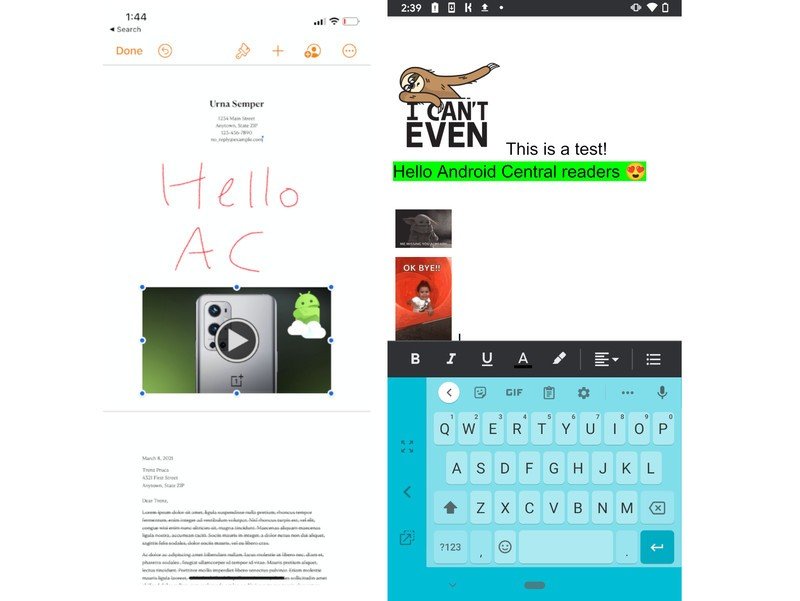
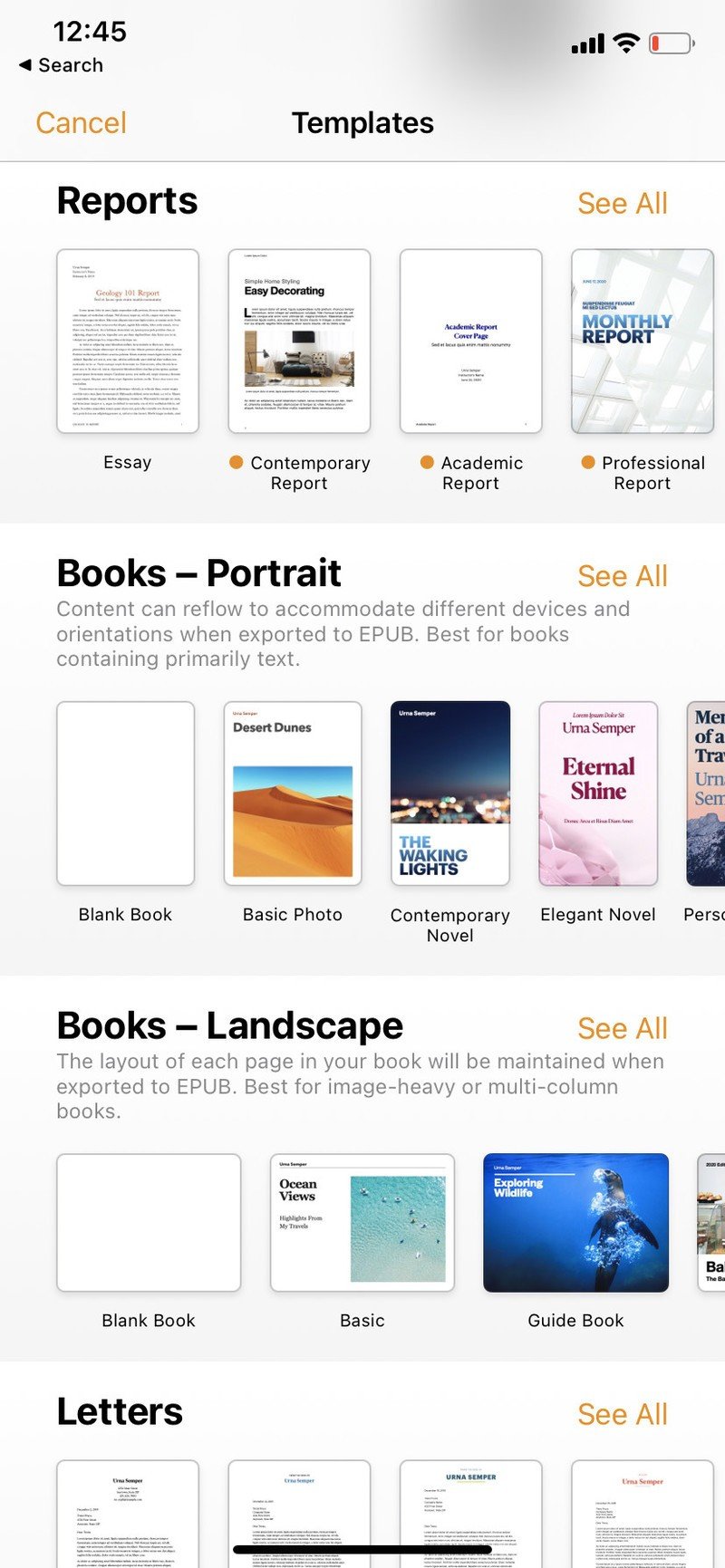
I was tempted to just skip past this comparison. Google Docs is by far the more popular of the two services for professional or personal use, while Pages tends to be ignored. But Apple's word processing app has some surprisingly robust features!
- There are a ton of templates to start with that make building pretty, printable documents fast
- You can turn on tracked changes that Microsoft Word will recognize if you export it as a .docx
- You can embed personal photos and videos, as well as YouTube or Vimeo videos, right into the document.
- You can scribble notes, drawings, or annotations directly onto the page.
- It auto-saves any changes pretty much instantly.
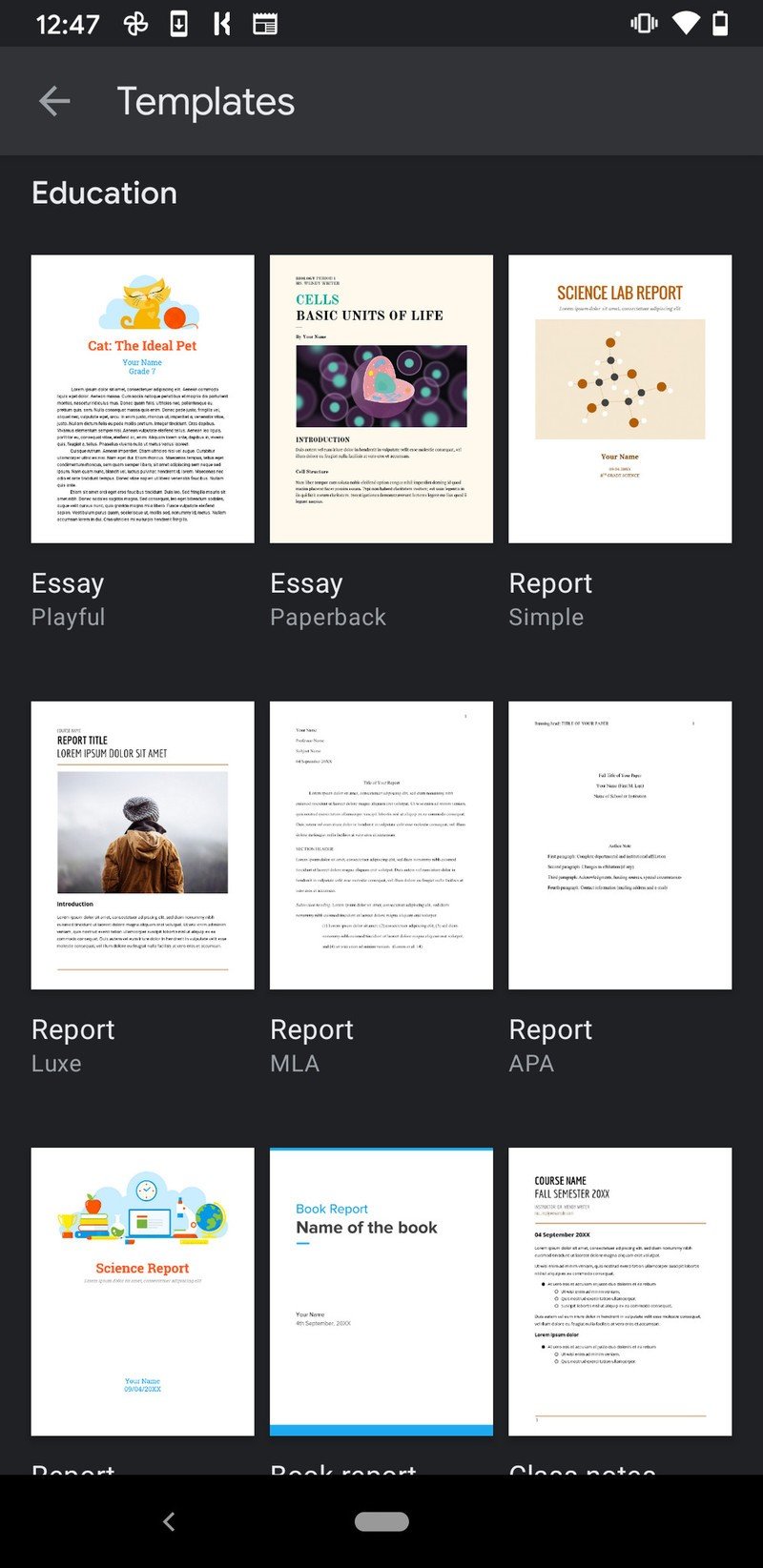
The Pages desktop app obviously has more to offer, but the mobile app is surprisingly complete. Apple users can comfortably edit their Pages projects offline, then view them instantly on their Macbook because the files save to iCloud. And so long as you turn on iCloud Drive, you can edit your files online and make them available for others to edit, including people without an iCloud account. You can even access these files on a Windows computer if you end up switching.
For comparison, Docs doesn't need much explanation because statistically, almost everyone reading this post uses it. You can share them with anyone, even people without Gmail accounts. Docs plays nice with Office files, and Smart Compose can be handy for saving time, especially when tapping away on a small screen. It's a popular collaborative tool for a reason.
When it comes to these apps, Numbers vs. Sheets, or Slides vs. Keynote, each company has its own unique features and strengths that justify using one or the other. It's simply the case that Google Workspace apps have been adopted widely, while iWork apps haven't achieved the same level of notoriety. And because Apple users can access Google Workplace apps on iOS, that means they don't need to switch to Android to take advantage of them.
Google Calendar vs. Apple Calendar
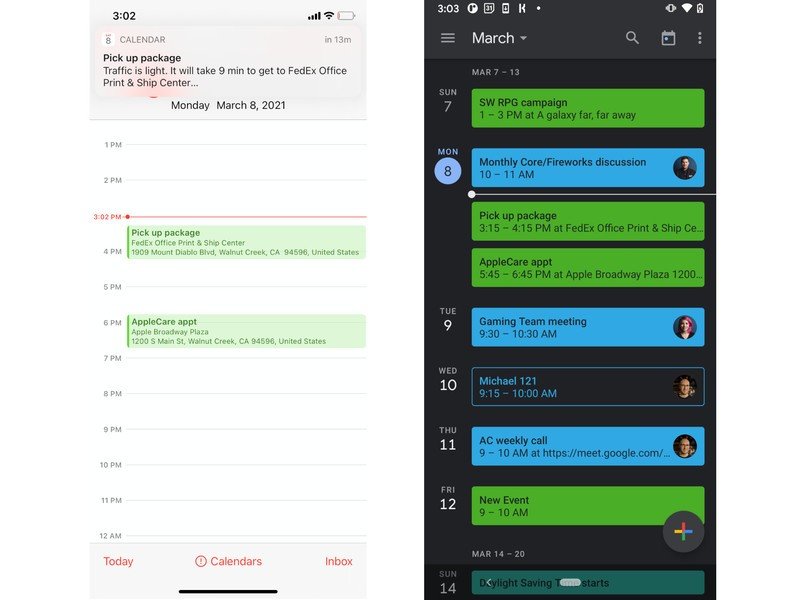
There are plenty of great Android calendar apps and Apple calendar apps, but most people stick with the complementary apps from Google and Apple. In my case, I took advantage of the two companies playing nice and imported Google Calendar directly into Apple Calendar, then set Google Calendar as my default iOS calendar. So whether I access my daily schedule on my phone, computer, or the web, there's no discrepancy between them.
The one perk of Apple Calendar that I love is the default alert option to let you know when it is time to leave for an event. You can also set specific alerts X minutes, hours, or days before, but it's the automated "get going, you idiot!" warning that most often saves me from disaster.
Otherwise, my Calendar set up piggybacks off of Gmail's very effective data mining, sending me automatic event invites based on what it finds in my private data. If Google didn't already know me and my browsing habits better than I know myself, I'd probably be uncomfortable about this, but I mostly just try not to think about it too much.
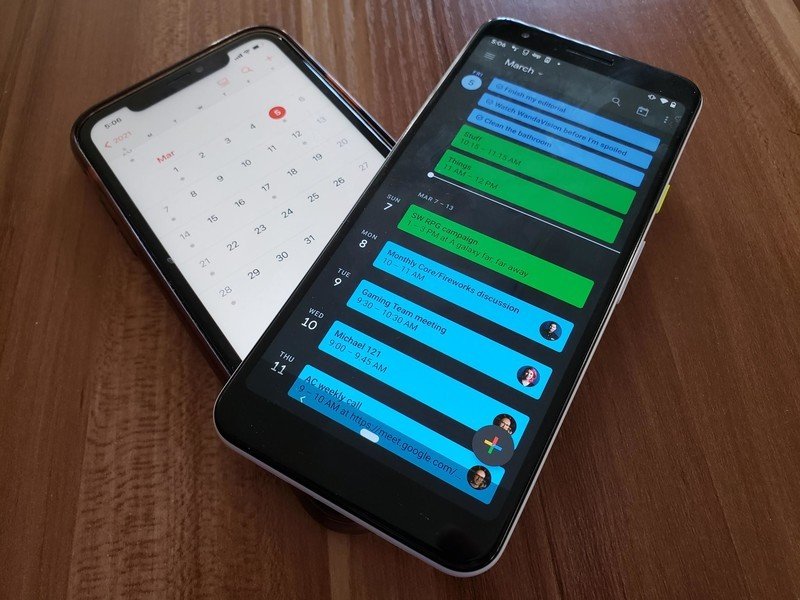
Apple and Google Calendars are so interchangeable that I basically forgot they were different apps.
Google fans would probably point out that Google Assistant integration makes adding or checking calendar invites a breeze, but believe it or not, Siri Calendar commands are surprisingly easy to use, either on your phone or Apple Watch. You can only access Google Calendar events on a Google Assistant speaker; but again, if Google Calendar is the default on iOS, then your iPhone-created events will instantly appear there.
This was all a long-winded way to say that iPhone and Android users can mostly get the same experience calendar-wise if they rely on Google, so there's nothing worth switching operating systems over here. You'll notice this is becoming a trend. Moving on!
Google Maps vs. Apple Maps
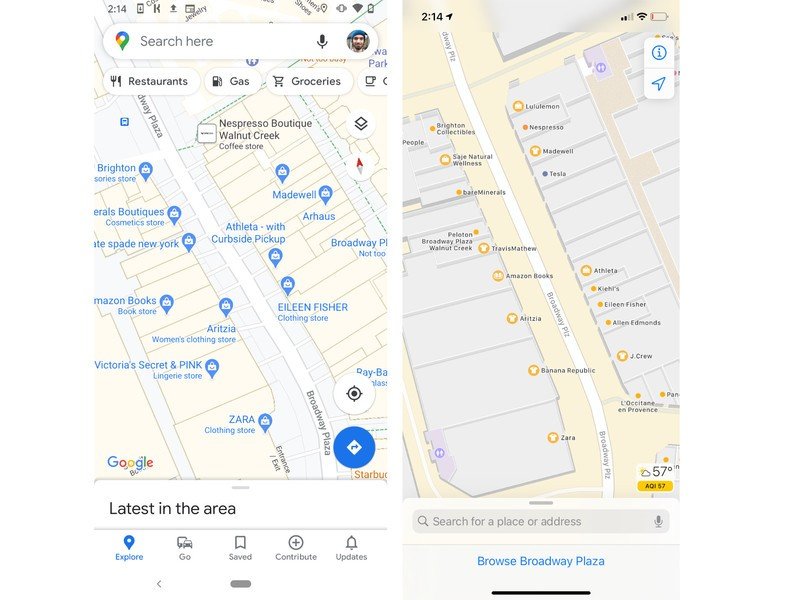
Like many iPhone owners, I've pretty much exclusively used Google Maps for the entirety of my smartphone-owning life. Anytime Apple took me automatically from Safari to Maps, I'd moan and groan until I could get the address pasted in my map app of choice. For years, Apple's version looked worse and felt less accurate than Google's, built off of years of satellite data. I knew that Apple had revamped its app in iOS 13, but at that point, all my saved addresses were in Google's system, and I didn't pay attention.
So unlike the other iOS vs. Android app showdowns, I had to spend more time with Apple's app to see how they actually compare. The most obvious and immediate difference is aesthetics and information delivery. Apple text and icons are smaller, which makes them much less accessible, but also tend to crowd the map far less while delivering more information. In contrast, Google makes its location icons larger but more generic, and many (non-sponsored) buildings remain empty blocks until you zoom in really close.
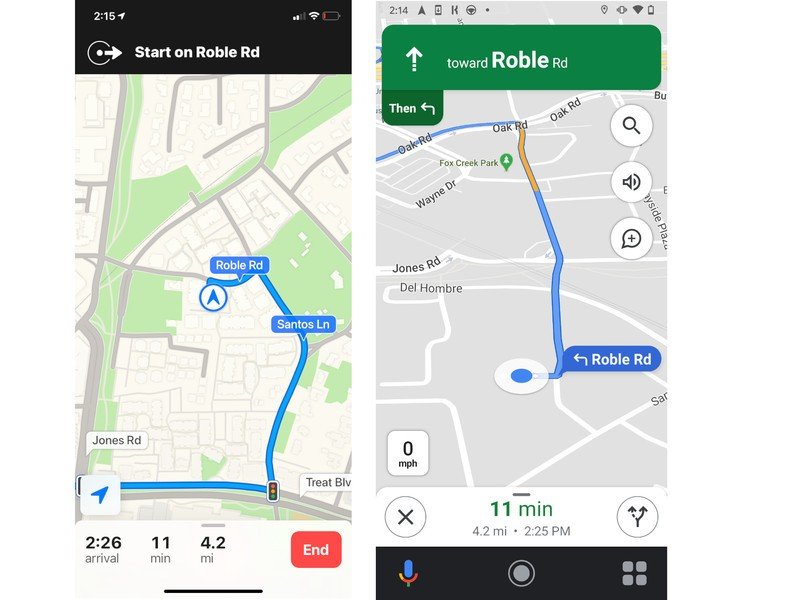
Everyone's taste is different, but frankly, Google's maps are just ugly and noisy compared to Apple's, which does particularly well-rendering buildings, the inside of malls, and landmarks to show the size of places and what you're looking for as you walk or drive.
Beyond the aesthetics, much of Apple's recommendations rely on Yelp, whereas Google can pull from its own reviews and search engine for recommendations and show more information like reviews and popular menu items in Google Maps without pulling you away to a separate app. It would be wonderful if Apple finally ditched Yelp for its own ratings and information sharing, but until then, I trust Google Maps more for just scrolling around local shops looking for something.
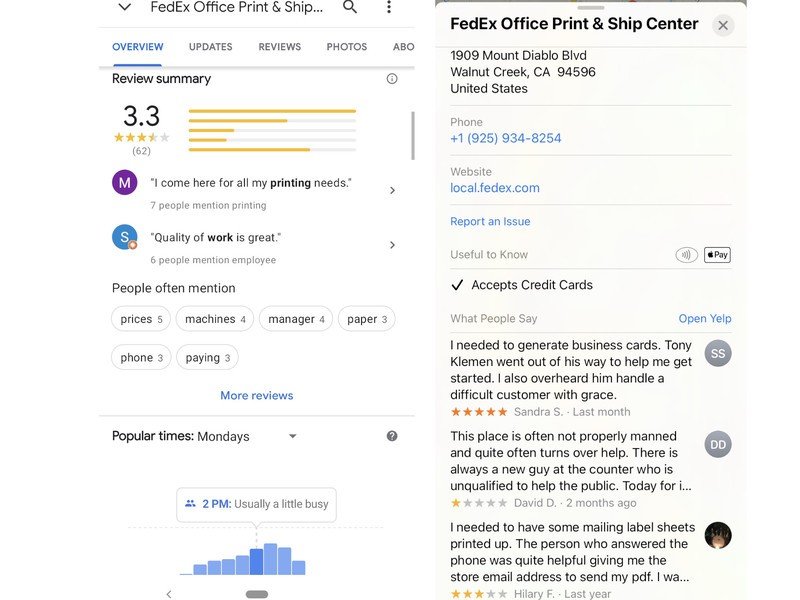
Google is also the only one to offer the option to download offline maps, which is useful for people living in or driving to more isolated areas. On the other hand, Google is notorious for storing and profiting off your search history, including driving directions. In contrast, Apple does a much better job of keeping your searches anonymous and only storing saved information on your device, not on the cloud.
Of course, Apple plays into stereotypes a bit when it comes to adding "new" features to Maps. It took far longer than Google to add cycling directions and only just added the ability to report hazards in Maps last month, about a year after Google Maps.
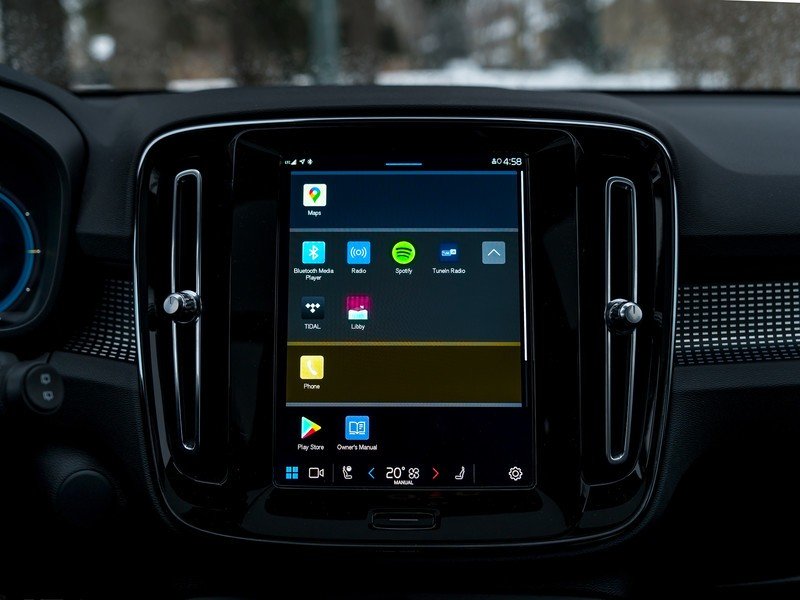
I could do a whole separate breakdown on Apple CarPlay vs. Android Auto, but the gist of that comparison is that both systems work perfectly well, but can be more distracting than drunk driving. The main difference is that Android Auto gives you Google Assistant so that you can keep your eyes on the road during long road trips.
Overall, Apple Maps still may not be the best map app, but it's no longer worth avoiding like the plague. Google Maps still works well, but it also doesn't have any exclusive features on Android that make it worth switching over for.
iOS apps vs. Android apps: what's different?
This comparison only scratches the surface of the differences between these ecosystems! I plan to dedicate a whole other column to how Siri and Google Assistant compare to one another, but there's a reason why Assistant has a better reputation. Then you have RCS vs iMessage, and the simple fact that people are always trying to find ways to bring iMessage to Android. And there are particular tools that both ecosystems offer exclusively or much better than the other.
Stepping outside of the core apps, iOS apps have a reputation of being generally safer, more polished, and more bug-free than Android apps. There are a few reasons for this: developers can make their iOS apps optimized for just a few screen sizes, while Android apps have a ton more configurations to code for; there's allegedly more money to be made in the US app marketplace, and Americans generally prefer iOS to Android; Apple's Bionic SoC chipsets can arguably outperform comparable Qualcomm Snapdragon chipsets in app loading times, and other reasons too technical to dive into here.
When it comes down to Apple and Google's first-party apps specifically, Google generally comes out on top. I could have continued to compare other apps for messaging, payments, music, and so on, but I decided to cut myself off once I realized that these comparisons didn't necessarily matter in the context of switching to either iOS or Android.
Android users aren't missing out on much when it comes to first-party software...but then again, neither are Apple users. Google is so good at porting its apps to iPhones that Apple fanatics won't see any perks for buying Android either! Everything Google has to offer, it places for free online regardless of platform so anyone can access it.
Google's iOS apps make iPhone owners more complacent and less likely to consider switching to Android.
Basically, Google steps in wherever Apple's apps don't hold up to scrutiny, providing a worthy alternative; by doing so, it makes sure that Apple's users remain comfortable where they are. Yes, switching to Android would mean a cheaper phone. But iPhones generally last longer thanks to consistent updates and thus have greater resale value if you want to upgrade — though Samsung phones may come close now that they get four years of updates.
There are other reasons to leave Apple behind and buy the best Android phones — and I'll be talking about those in upcoming columns — but software may not be one of them.

Michael is Android Central's resident expert on wearables and fitness. Before joining Android Central, he freelanced for years at Techradar, Wareable, Windows Central, and Digital Trends. Channeling his love of running, he established himself as an expert on fitness watches, testing and reviewing models from Garmin, Fitbit, Samsung, Apple, COROS, Polar, Amazfit, Suunto, and more.
